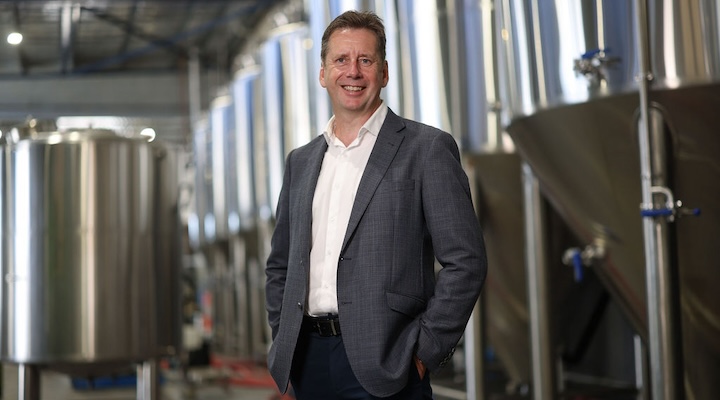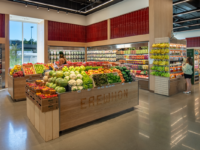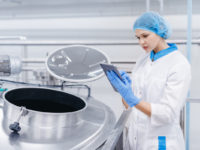On Queensland’s Sunshine Coast, an Australian-first collaborative food and beverage manufacturing precinct is being created, aimed at helping SMEs break through the barriers that make it hard to scale up into national, or even international, manufacturing companies.
Andrew Eves-Brown, CEO and project director of the Turbine Precinct, who has helped lead three companies through the challenging scaling process from small manufacturers into major businesses, says venture capitalists describe the scaling of a $2 million SME into a $20 million big business as a ‘Valley of Death’.
“But I call it the Valley of Growth. All the SMEs go through this period where they have to invest heavily in capital expenditure and people and infrastructure, and that puts them into a really difficult position for five to 10 years.”
Enter the Turbine Precinct, a concept where up to 10 small companies can lease space for their head office and processing facilities and share the more expensive resources such as steam, refrigeration and wastewater treatment, warehouse space and management, and research and development facilities, saving a significant amount of working capital.
The precinct will provide comprehensive support spanning the entire lifecycle of food and beverage SMEs, from initial product conception to international market expansion. Eves-Brown says this holistic approach addresses a critical gap in Queensland’s infrastructure, where the absence of such facilities hampers the ability of startups to bring innovations to market and scale their operations.
An experienced manufacturing systems engineer, working in food manufacturing for 30 years Eves-Brown has successfully navigated that ‘Valley of Growth’ three times with three different companies, and is passionate about making sure the Turbine Precinct can make the journey easier and more affordable for small businesses.
Ten years in the making
The Turbine Precinct’s journey began about 10 years ago when the Sunshine Coast Regional Council released its Regional Economic Development Strategy.
Back then, Eves-Brown was the COO at fresh processed herb company Gourmet Garden when he was invited to chair a food and agribusiness task force, one of several key industries identified as being high-value for the region’s business growth. The group looked at the potential to expand and what resources would be needed to encourage economic development.
“Once we discovered how big the industry was, the second step was to look at how we could get the industry to work together.”
Subsequently, Eves-Brown and some industry compatriots launched the Food and Agribusiness Network (Fan) to help bring together companies large and small to collaborate in finding ways to build the food and beverage industry coast.
At the time, Gourmet Garden had grown into a multimillion-dollar business with 200 staff. In a region where 97 per cent of businesses were SMEs, Eves-Brown thought: ‘Wouldn’t it be great if there were another five Gourmet Gardens?’ How can we help some of these food and ag businesses break through that?
Since then, the Sunshine Coast region’s F&B industry has grown from around $430 million in annual contribution to the regional economy to $1 billion.
“It was always a vision that if we could get the smaller businesses to become larger businesses, the region would benefit,” says Eves-Brown.
“That’s how the idea of Turbine was born – Wouldn’t it be great if we had a collaborative precinct where people could share in the infrastructure, some services and some resources?
“We are very much about taking away the stress and the challenges of growth.”
Initially, the industry group struggled to make headway with the concept, until, with the advent of Covid, the Federal Government looked for ways to bring manufacturing back to Australia. With that came the opportunity for the Fan to access funding, which allowed Turbine to become a reality.
Suitable land was identified, and Turbine – established as a not-for-profit business – began to approach potential tenants. A developer partner came on board who will buy the land off the state government, and construct the facility. Government grants will cover the cost of installing specialist equipment to be shared by tenants – facilities such as boilers, chillers, and wastewater treatment, all often prohibitively expensive for a small company to invest in and which depreciate over time, straining the resources of small businesses.
The Turbine Precinct will also employ highly skilled specialists such as engineering managers or research and development personnel who will work with the tenants.
The first facilities are on schedule to be operational by mid-next year, with Turbine Precinct hoping to attract companies in the natural and healthy space so there is a common vision and cause around what everyone is trying to produce.
Tenancies start from 300sqm square metres of dedicated space – on top of the space taken up by shared services and warehousing – up to 4000sqm. The tenants are likely to be those that have hit the circa-$2 million turnover point, but need to commence a transformational journey to scale up to $20 million and be able to achieve national distribution.
“These sorts of companies are looking to put in ERP systems and build a management team. That’s a big ask when you’re a $2 million business and you need to spend maybe $2 million to $3 million to grow. But if we can help them get to $20 million, by the time they get to that stage, to be able to stand on their own in their own factory suddenly becomes more affordable.”
Eves-Brown says that while the first tenant has yet to be signed up, there is a lot of interest and many conversations. Among the most likely inaugural tenants is a company called Queensland Drinks Accelerator (QDA), a contract beverage manufacturer, which would be a boost for the region given most contractors are based in Sydney or Melbourne and there’s a market need for a local supplier.
Positioned 7km from the Bruce Highway arterial road route, 99km from the Port of Brisbane, 75km from Brisbane Airport and 30km from the Sunshine Coast Airport, Turbine Precinct is ideally located to solve the logistical challenges of moving finished products around the country and even internationally.
Eves-Brown is eager to stress that without the support of both Federal and State governments, and their understanding of how a collaborative manufacturing framework could work, the Turbine Precinct would not have come to fruition. He also sees it as a testbed for other industries.
“If this works for food and beverage, there is no reason that other sectors couldn’t do something similar.
“If we can help small businesses through that valley of growth we are going to have more successful small businesses on the coast, which means more jobs, more benefits for the region, and more benefits for our kids.”








